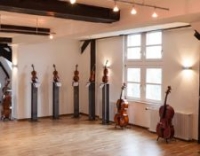Acquiring a fortune is hard enough. But today it's almost harder to preserve capital and increase it conservatively.
One reason is that real interest rates for cash deposits in banks and savings banks are heading towards zero. Government bonds offered by first-class debtor countries hardly yield profits any more. Corporate bonds are fraught with risks. Due to their high volatility in the markets, stocks are recommended only for investors with stamina and nerves of steel.
Violin assets
What is not generally known: high-quality string instruments can be interesting assets due to the stable value they generate. "Top instruments are extremely stable in terms of value retention," says Christian Reister, co-owner of Violin Assets GmbH. The young company is located at Bedburg Castle near Cologne, specialising in the business of high-quality string instruments.
A big advantage: "The performance of string instruments is almost entirely independent of other asset classes such as stocks, pensions, gold or real estate," Reister explains. In addition, the instrument market is largely dominated by long-term investors. "This is likely one reason why top instruments even show a clear tendency to increase in value," says Christian Reister. According to the "Fuchs Taxe" relevant to this market, high-quality string instruments have recorded an average increase in value of between five and eight percent p.a. in the past one hundred years. Individual pieces that are particularly high profile are significantly higher.
Investment and patronage
It follows that the step from "investor" to "patron" is just a small one. The fact is that gifted young musicians, or virtuoso soloists already established, have a great need for top instruments. It is for this reason that many owners of master violins, violas or cellos make their instrument available on loan to an exceptional artist.
String instruments make suitable investments for private investors, but also for foundations - provided that one of the foundation's objectives is related to art/culture or is to foster excellence, and such an investment is thus in line with the foundation's charter and its funding purposes. From an investment point of view, a high-quality instrument meets the criteria that are relevant for foundations: yield, security and liquidity. Prices for modern instruments begin at about €30,000; historical instruments make worthwhile investments starting at about €100,000.
Promoting excellence
"A few months ago, we helped connect a German foundation with a valuable Zanoli cello," says Christian Reister. Violin Assets was also instrumental in introducing the foundation to the young cellist Manuel Lipstein. The foundation provided him with the instrument on a long-term basis in April of this year. He played his first concerts with the cello in June. Critics wrote: "Manuel Lipstein made his cello sing, and the enchantingly beautiful song filled the conference centre with rich sound..."
For more information visit violin-assets






